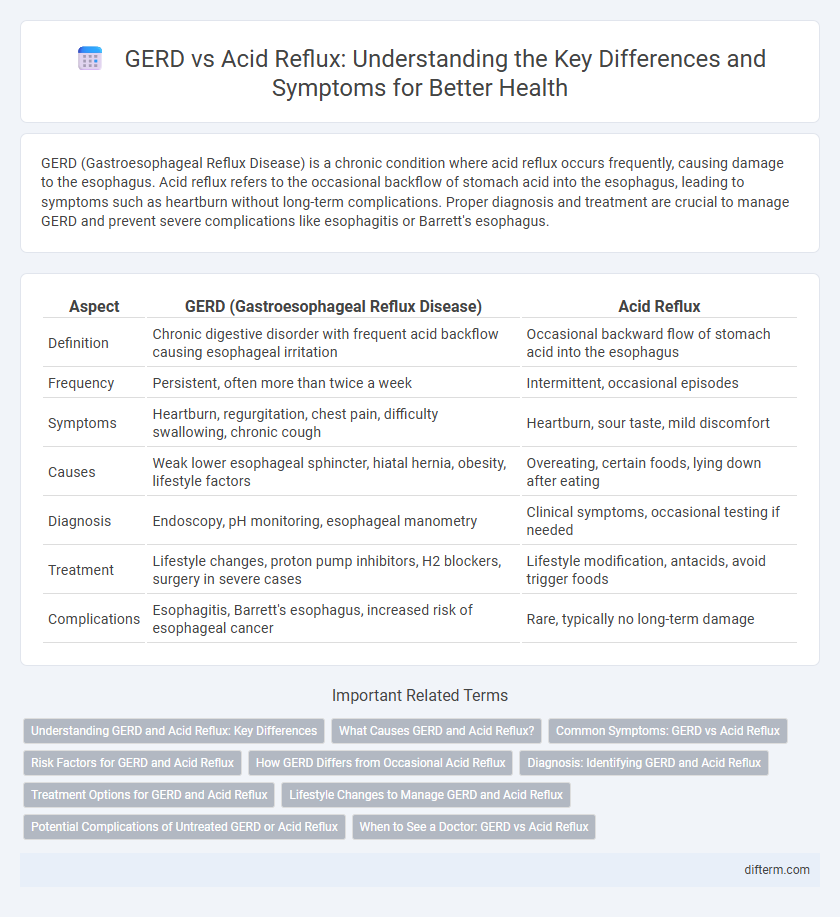GERD (Gastroesophageal Reflux Disease) is a chronic condition where acid reflux occurs frequently, causing damage to the esophagus. Acid reflux refers to the occasional backflow of stomach acid into the esophagus, leading to symptoms such as heartburn without long-term complications. Proper diagnosis and treatment are crucial to manage GERD and prevent severe complications like esophagitis or Barrett's esophagus.
Table of Comparison
| Aspect | GERD (Gastroesophageal Reflux Disease) | Acid Reflux |
|---|---|---|
| Definition | Chronic digestive disorder with frequent acid backflow causing esophageal irritation | Occasional backward flow of stomach acid into the esophagus |
| Frequency | Persistent, often more than twice a week | Intermittent, occasional episodes |
| Symptoms | Heartburn, regurgitation, chest pain, difficulty swallowing, chronic cough | Heartburn, sour taste, mild discomfort |
| Causes | Weak lower esophageal sphincter, hiatal hernia, obesity, lifestyle factors | Overeating, certain foods, lying down after eating |
| Diagnosis | Endoscopy, pH monitoring, esophageal manometry | Clinical symptoms, occasional testing if needed |
| Treatment | Lifestyle changes, proton pump inhibitors, H2 blockers, surgery in severe cases | Lifestyle modification, antacids, avoid trigger foods |
| Complications | Esophagitis, Barrett's esophagus, increased risk of esophageal cancer | Rare, typically no long-term damage |
Understanding GERD and Acid Reflux: Key Differences
GERD (Gastroesophageal Reflux Disease) is a chronic, more severe form of acid reflux characterized by frequent acid backflow that damages the esophageal lining, while acid reflux itself refers to occasional stomach acid rising into the esophagus causing mild discomfort. Acid reflux symptoms include heartburn, regurgitation, and sour taste, whereas GERD involves persistent symptoms and complications such as esophagitis, Barrett's esophagus, or respiratory issues. Accurate diagnosis involves endoscopy, pH monitoring, and symptom assessment to distinguish between benign acid reflux and damaging GERD requiring medical intervention.
What Causes GERD and Acid Reflux?
GERD and acid reflux occur when stomach acid frequently flows back into the esophagus due to a weakened lower esophageal sphincter (LES). Common causes include obesity, hiatal hernia, certain foods, smoking, and stress, which can all contribute to LES dysfunction and increase acid exposure. Persistent acid reflux leads to GERD, a chronic condition causing inflammation and damage to the esophageal lining.
Common Symptoms: GERD vs Acid Reflux
GERD (Gastroesophageal Reflux Disease) and acid reflux share common symptoms such as heartburn, regurgitation, and chest discomfort, but GERD symptoms tend to be more persistent and severe. Acid reflux typically causes occasional burning sensations in the chest or throat after eating, while GERD may lead to chronic cough, laryngitis, and difficulty swallowing due to prolonged acid exposure. Understanding symptom frequency and severity helps differentiate GERD from occasional acid reflux episodes for effective diagnosis and treatment.
Risk Factors for GERD and Acid Reflux
Risk factors for GERD include obesity, hiatal hernia, pregnancy, smoking, and prolonged use of certain medications such as NSAIDs and calcium channel blockers. Acid reflux risk factors overlap with GERD but primarily involve dietary triggers like spicy foods, caffeine, and alcohol, as well as eating large meals or lying down soon after eating. Both conditions are exacerbated by lifestyles that promote increased stomach acid production and weakened lower esophageal sphincter function.
How GERD Differs from Occasional Acid Reflux
GERD (Gastroesophageal Reflux Disease) is a chronic condition characterized by frequent, persistent acid reflux episodes that cause damage to the esophageal lining, unlike occasional acid reflux which occurs sporadically and typically resolves without medical intervention. GERD symptoms include heartburn, regurgitation, and difficulty swallowing, often requiring long-term management and lifestyle changes to prevent complications such as esophagitis or Barrett's esophagus. Occasional acid reflux is usually triggered by specific foods or behaviors and does not lead to sustained esophageal injury, distinguishing it from the more serious and recurrent nature of GERD.
Diagnosis: Identifying GERD and Acid Reflux
Diagnosing GERD and acid reflux involves assessing symptom frequency, severity, and impact on daily life through clinical evaluation and patient history. Esophageal pH monitoring measures acid exposure levels, distinguishing GERD from occasional acid reflux. Endoscopy may be used to detect esophageal inflammation or damage, providing further evidence for GERD diagnosis.
Treatment Options for GERD and Acid Reflux
Treatment options for GERD (Gastroesophageal Reflux Disease) often include proton pump inhibitors (PPIs) such as omeprazole and lifestyle modifications like weight loss and dietary changes. Acid reflux, a milder form of GERD, can be managed with over-the-counter antacids and H2 blockers like ranitidine. Surgical options like fundoplication are reserved for severe GERD cases unresponsive to medication.
Lifestyle Changes to Manage GERD and Acid Reflux
Lifestyle changes such as avoiding spicy and fatty foods, maintaining a healthy weight, and eating smaller meals can significantly reduce symptoms of GERD and acid reflux. Elevating the head of the bed by 6 to 8 inches helps prevent nighttime acid reflux by keeping stomach acid from traveling back into the esophagus. Quitting smoking and limiting alcohol intake also improve lower esophageal sphincter function, reducing acid reflux episodes.
Potential Complications of Untreated GERD or Acid Reflux
Untreated GERD or acid reflux can lead to serious complications such as esophagitis, Barrett's esophagus, and esophageal strictures, increasing the risk of esophageal cancer. Chronic acid exposure damages the esophageal lining, causing inflammation, ulcers, and scarring that impair swallowing and quality of life. Severe untreated cases may also trigger respiratory issues like chronic cough, asthma exacerbations, or aspiration pneumonia due to acid entering the airway.
When to See a Doctor: GERD vs Acid Reflux
Persistent heartburn occurring more than twice a week may indicate gastroesophageal reflux disease (GERD) rather than occasional acid reflux, warranting medical evaluation to prevent complications such as esophagitis or Barrett's esophagus. Immediate consultation is advised if symptoms include difficulty swallowing, persistent nausea or vomiting, unexplained weight loss, or chest pain mimicking a heart attack. Early diagnosis and treatment by a healthcare professional are crucial to managing GERD effectively and minimizing long-term damage to the esophageal lining.
GERD vs acid reflux Infographic

 difterm.com
difterm.com